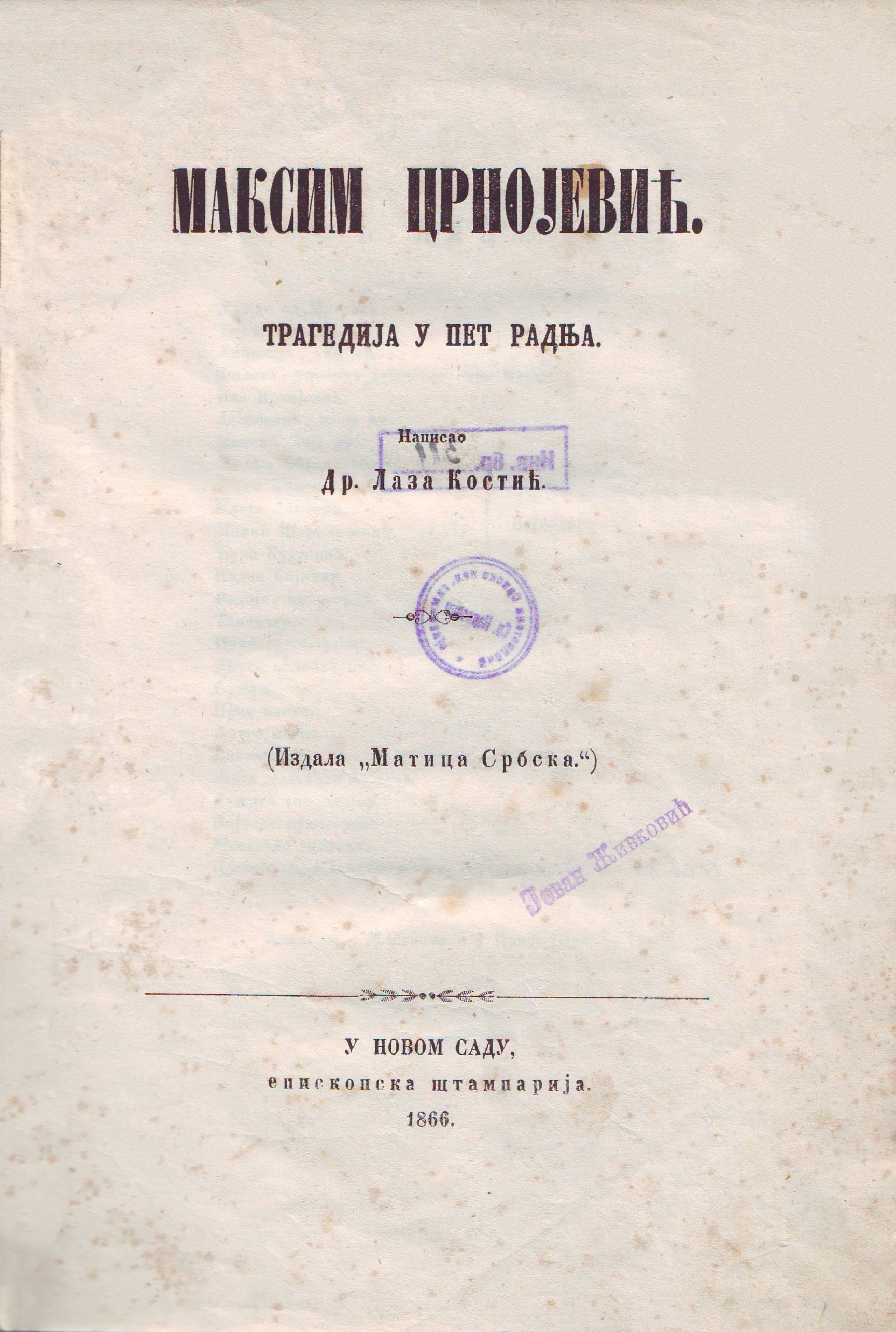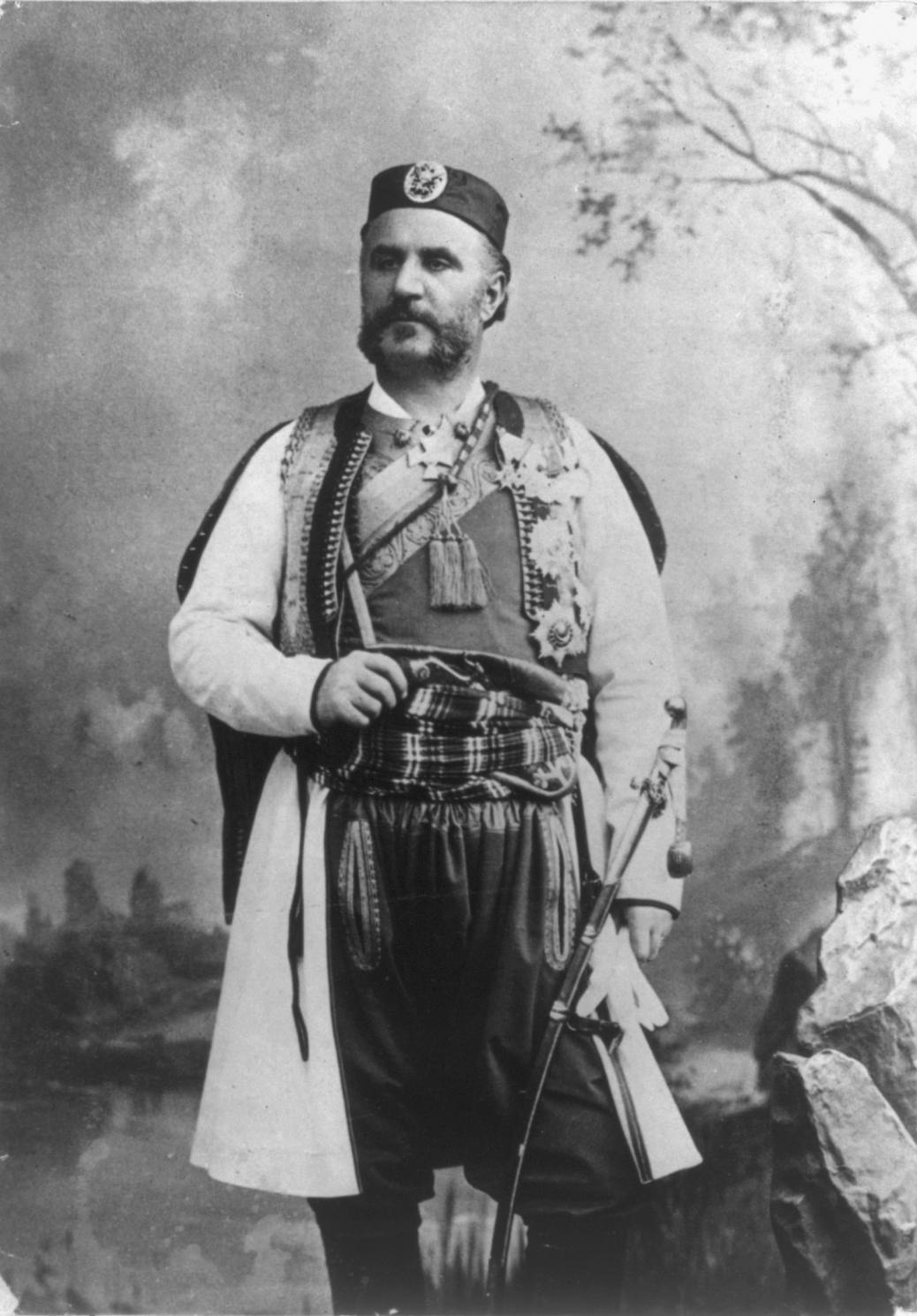|
Petar II Petrović-Njegoš
Petar II Petrović-Njegoš ( sr-cyrl, Петар II Петровић-Његош, ; – ), commonly referred to simply as Njegoš (), was a Prince-Bishop (''vladika'') of Montenegro, poet and philosopher whose works are widely considered some of the most important in Montenegrin and Serbian literature. Njegoš was born in the village of Njeguši, near Montenegro's then-capital Cetinje. He was educated at several Serbian monasteries and became the country's spiritual and political leader following the death of his uncle Petar I. After eliminating all initial domestic opposition to his rule, he concentrated on uniting Montenegro's tribes and establishing a centralized state. He introduced regular taxation, formed a personal guard and implemented a series of new laws to replace those composed by his predecessor many years earlier. His taxation policies proved extremely unpopular with the tribes of Montenegro and were the cause of several revolts during his lifetime. Njegoš' ... [...More Info...] [...Related Items...] OR: [Wikipedia] [Google] [Baidu] |
Njeguši
Njeguši ( cnr, Његуши) is a village in the Cetinje Municipality of southern Montenegro, located on the slopes of Mount Lovćen, within the Lovćen national park. It is part of the territory of Njeguši (tribe), Njeguši tribe. Demographics According to the 2003 census, the village had 17 inhabitants, of whom 15 declared as Montenegrins (ethnic group), Montenegrins, 1 as Serbs, Serb, and 1 Unknown. According to 2011 census, there were 35 inhabitants, 33 of whom were Montenegrins, one did not want to reveal ethnicity and one was a Russian. References Populated places in Cetinje Municipality {{Montenegro-geo-stub ... [...More Info...] [...Related Items...] OR: [Wikipedia] [Google] [Baidu] |
Sima Milutinović Sarajlija
Simeon "Sima" Milutinović "Sarajlija" ( sr-cyr, Симеон "Сима" Милутиновић "Сарајлија", ; 3 October 1791 – 30 December 1847) was a poet, hajduk, translator, historian and adventurer. Literary critic Jovan Skerlić dubbed him ''the first Serbian romantist''. Life and work Sima Milutinović was born in Sarajevo, Ottoman Empire in 1791, hence his nickname Sarajlija (''The Sarajevan''). His father Milutin was from the village of Rožanstvo near Užice, which he left running away from the plague and eventually settled in Sarajevo, where he was married. When Sarajlija was a child, the family fled the town seeking because of a plague. They sought refuge at several locations in Bosnia and Slavonski Brod before ending up in Zemun, where Sima commenced primary education which he never completed. He attended a school in Szeged and was later expelled from gymnasium in Sremski Karlovci. During the First Serbian Uprising he was a scribe in Karađorđe's Gov ... [...More Info...] [...Related Items...] OR: [Wikipedia] [Google] [Baidu] |
Laza Kostić
Lazar "Laza" Kostić ( sr-Cyrl, Лазар "Лаза" Костић; 12 February 1841 – 27 November 1910) was a Serbian poet, prose writer, lawyer, aesthetician, journalist, publicist, and politician who is considered to be one of the greatest minds of Serbian literature. Kostić wrote around 150 lyrics, 20 epic poems, three dramas, one monograph, several essays, short stories, and a number of articles. Kostić promoted the study of English literature and together with Jovan Andrejević-Joles was one of the first to begin the systematic translation of the works of William Shakespeare into the Serbian language. Kostić also wrote an introduction of Shakespeare's works to Serbian culture. Biography Laza Kostić was born in 1841 in Kovilj, Vojvodina—which was then part of the Austro-Hungarian Empire—to a military family. He had Aromanian ancestry. Kostić graduated from the Law School of the University of Budapest and received a Doctor of Philosophy in jurisprudence at the sa ... [...More Info...] [...Related Items...] OR: [Wikipedia] [Google] [Baidu] |
Jovan Skerlić
Jovan Skerlić (, ; 20 August 1877 – 15 May 1914) was a Serbian writer and literary critic.''Jovan Skerlić u srpskoj književnosti 1877–1977: Zbornik radova''. Posebna izdanja, Institut za knjizevnost i umetnost, Belgrade. He is seen as one of the most influential Serbian literary critics of the early 20th century, after Bogdan Popović, his professor and early mentor. Skerlić was buried in the Novo groblje cemetery in Belgrade. at the New Graveyard Bibliography His collected works include: * * * * * * * * * * * * * * *References External links [...More Info...] [...Related Items...] OR: [Wikipedia] [Google] [Baidu] |
Nicholas I Of Montenegro
Nikola I Petrović-Njegoš ( sr-cyr, Никола I Петровић-Његош; – 1 March 1921) was the last monarch of Montenegro from 1860 to 1918, reigning as prince from 1860 to 1910 and as the country's first and only king from 1910 to 1918. Biography Early life Nikola was born in the village of Njeguši, the home of the reigning House of Petrović. He was the son of Mirko Petrović-Njegoš, a celebrated Montenegrin warrior (an elder brother to Danilo I of Montenegro) and his wife, Anastasija Martinovich (1824–1895). After 1696, when the dignity of vladika, or prince-bishop, became hereditary in the Petrović family, the sovereign power had descended from uncle to nephew, the vladikas belonging to the order of the black clergy (i.e., monastic clergy) who are forbidden to marry. A change was introduced by Danilo I, who declined the episcopal office, married and declared the principality hereditary in the direct male line. Mirko Petrović-Njegoš having renounced his cla ... [...More Info...] [...Related Items...] OR: [Wikipedia] [Google] [Baidu] |
Mićo Ljubibratić
Mihajlo "Mićo" Ljubibratić ( sr-cyr, Мићо Љубибратић; 1839 – 26 February 1889) was a Serbian ''voivode'' (military commander), Orthodox priest, writer and translator that participated in the many uprisings in the Herzegovina region. He was the first person in the Balkans to translate the Quran into Serbian. Greek, Bulgarian, Romanian and Albanian translations would follow in the 20th century. Life Mihajlo Ljubibratić was born in Ljubovo, Trebinje (modern Bosnia and Herzegovina). In the Herzegovinian Uprising (1857–1862), he joined Luka Vukalović. He supported Garibaldi in the Italian revolution. After the fall of the uprising (1862), he goes to Serbia where he continues organizing the liberation of Balkan peoples, also seeking to add Slavic Muslims in the bands. In the Herzegovina Uprising (1875-1878), the Serbian government, which dare not to publicly assist because of international pressure, secretly sends Ljubibratić among others to lead the uprising. In ... [...More Info...] [...Related Items...] OR: [Wikipedia] [Google] [Baidu] |
Marko Miljanov
Marko Miljanov Popović ( sr-Cyrl, Марко Миљанов Поповић, ; 25 April 1833 – 2 February 1901) was a Brda chieftain and Montenegrin general and writer. He entered the service of Danilo I, the first secular Prince of Montenegro in the modern era, and led his armed Kuči tribe against the Ottoman Empire in the wars of 1861–62 and 1876–78, distinguishing himself as an able military leader. He managed to unite his tribe with Montenegro in 1874. There was later a rift between Miljanov and Prince Nikola I. He was also an accomplished writer who gained repute for his descriptions of Montenegrin society. His grand-daughter Olgivanna Lloyd Wright headed Frank Lloyd Wright's iconic fellowship and foundation in the United States. Biography Marko was born in the village of Medun on 25 April ( St. Mark's Day) 1833, and was given the name "Marko" accordingly. His father was Miljan Jankov Popović, his mother Borika, born in Oraovo. He was baptized by Orthodox prie ... [...More Info...] [...Related Items...] OR: [Wikipedia] [Google] [Baidu] |
Stefan Mitrov Ljubiša
Stefan may refer to: * Stefan (given name) * Stefan (surname) * Ștefan, a Romanian given name and a surname * Štefan, a Slavic given name and surname * Stefan (footballer) (born 1988), Brazilian footballer * Stefan Heym, pseudonym of German writer Helmut Flieg (1913–2001) * Stefan (honorific), a Serbian title * ''Stefan'' (album), a 1987 album by Dennis González See also * Stefan number, a dimensionless number used in heat transfer * Sveti Stefan Sveti Stefan ( Montenegrin and Serbian: Свети Стефан, ; lit. "Saint Stephen") is a town in Budva Municipality, on the Adriatic coast of Montenegro, approximately southeast of Budva. The town is known for the Aman Sveti Stefan resort, ... or Saint Stefan, a small islet in Montenegro * Stefanus (other) {{Disambiguation ... [...More Info...] [...Related Items...] OR: [Wikipedia] [Google] [Baidu] |
Ivan Mažuranić
Ivan Mažuranić (; 11 August 1814 – 4 August 1890) was a Croatian poet, linguist, lawyer and politician who is considered to be one of the most important figures in Croatia's political and cultural life in the mid-19th century. Mažuranić served as Ban of Kingdom of Croatia-Slavonia between 1873 and 1880, and since he was the first ban not to hail from old nobility, he was known as ''Ban pučanin'' (Ban commoner). His realistic assessment of strengths and weaknesses of Croatia's position between Austrian bureaucracy and Hungarian expansionist nationalism proved invaluable to his home country during the wider political turmoil in mid and late 19th century Europe. Mažuranić is best remembered for his contributions to the development of the Croatian law system, economics, linguistics, and poetry. Life and education Ivan Mažuranić was born on 11 August 1814 as the third of four sons into a well-to-do yeoman family of Ivan Mažuranić Petrov in Novi Vinodolski in northern c ... [...More Info...] [...Related Items...] OR: [Wikipedia] [Google] [Baidu] |
Alexander Pushkin
Alexander Sergeyevich Pushkin (; rus, links=no, Александр Сергеевич ПушкинIn pre-Revolutionary script, his name was written ., r=Aleksandr Sergeyevich Pushkin, p=ɐlʲɪkˈsandr sʲɪrˈɡʲe(j)ɪvʲɪtɕ ˈpuʂkʲɪn, a=ru-Pushkin.ogg; ) was a Russian poet, playwright, and novelist of the Romantic era.Basker, Michael. Pushkin and Romanticism. In Ferber, Michael, ed., ''A Companion to European Romanticism''. Oxford: Blackwell, 2005. He is considered by many to be the greatest Russian poetShort biography from University of Virginia . Retrieved 24 November 2006.Allan Rei ... [...More Info...] [...Related Items...] OR: [Wikipedia] [Google] [Baidu] |
Lord Byron
George Gordon Byron, 6th Baron Byron (22 January 1788 – 19 April 1824), known simply as Lord Byron, was an English romantic poet and Peerage of the United Kingdom, peer. He was one of the leading figures of the Romantic movement, and has been regarded as among the greatest of English poets. Among his best-known works are the lengthy Narrative poem, narratives ''Don Juan (poem), Don Juan'' and ''Childe Harold's Pilgrimage''; many of his shorter lyrics in ''Hebrew Melodies'' also became popular. Byron was educated at Trinity College, Cambridge, later traveling extensively across Europe to places such as Italy, where he lived for seven years in Venice, Ravenna, and Pisa after he was forced to flee England due to lynching threats. During his stay in Italy, he frequently visited his friend and fellow poet Percy Bysshe Shelley. Later in life Byron joined the Greek War of Independence fighting the Ottoman Empire and died leading a campaign during that war, for which Greeks rev ... [...More Info...] [...Related Items...] OR: [Wikipedia] [Google] [Baidu] |
John Milton
John Milton (9 December 1608 – 8 November 1674) was an English poet and intellectual. His 1667 epic poem '' Paradise Lost'', written in blank verse and including over ten chapters, was written in a time of immense religious flux and political upheaval. It addressed the fall of man, including the temptation of Adam and Eve by the fallen angel Satan and God's expulsion of them from the Garden of Eden. ''Paradise Lost'' is widely considered one of the greatest works of literature ever written, and it elevated Milton's widely-held reputation as one of history's greatest poets. He also served as a civil servant for the Commonwealth of England under its Council of State and later under Oliver Cromwell. Writing in English, Latin, and Italian, Milton achieved global fame and recognition during his lifetime; his celebrated ''Areopagitica'' (1644), written in condemnation of pre-publication censorship, is among history's most influential and impassioned defences of freedom of spe ... [...More Info...] [...Related Items...] OR: [Wikipedia] [Google] [Baidu] |








